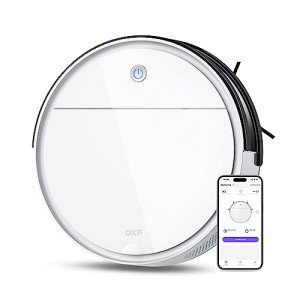How To Get More Benefits Out Of Your Robotic Vacuum
The Rise of the Robotic Vacuum Cleaner: Revolutionizing Home Cleaning
In the world of family devices, robotic vacuum cleaners have become one of the most substantial innovations in recent years. These autonomous gadgets provide convenience and effectiveness, allowing house owners to preserve cleaner living spaces without the drudgery of manual vacuuming. This short article checks out the advancement, functionality, advantages, and considerations regarding robotic vacuum cleaners, along with providing insights through information tables and frequently asked questions.
A Brief History of Robotic Vacuum Cleaners
The journey of robotic vacuum cleaners began in the late 20th century, with early models failing to make significant strides in homes. Nevertheless, developments in technology led to the intro of more refined models in the early 2000s. Business such as iRobot and Neato played a pivotal function in popularizing these clever home devices.
Advancement Timeline of Robotic Vacuum Cleaners
Year
Milestone
1996
Release of the first robotic vacuum, the ELECTROLUX TRINITY
2002
iRobot introduces the Roomba, an extensively acknowledged design
2012
Intro of models with sophisticated mapping abilities
2020
Incorporation of expert system for boosted navigation
2023
Models with incorporated wise home connection and app control
How Robotic Vacuum Cleaners Work
Robotic vacuum cleaners utilize a mix of sensors, mapping innovation, and expert system to navigate and tidy various surface areas efficiently. Here's a simplified overview of their core functionality:
Sensors: Equipped with infrared or ultrasonic sensing units, these devices can spot obstacles, cliffs, and dirt, enabling them to browse through rooms without crashing into furnishings or toppling down stairs.
Navigation: Most modern-day robotic vacuum cleaners incorporate wise mapping technologies, permitting them to draw up the home design and enhance cleaning paths.
Cleaning Mechanism: Using brushes and suction power, robotic vacuums gather dirt, dust, and debris from various floor types, consisting of carpets and wood.
Charging and Cleaning Schedules: After finishing a cleaning session or when their battery runs low, these robots instantly return to their charging dock. Users can set cleaning schedules through mobile phone apps, helping preserve a neat home effortlessly.
Benefits of Robotic Vacuum Cleaners
Robotic vacuum cleaners use various advantages over standard vacuuming techniques. Here are a few of the essential benefits:
- Time-Saving: Automated cleaning indicates house owners can allocate their time to other activities.
- Convenience: Scheduling cleaning sessions permits a clean home without manual intervention.
- Thorough Cleaning: Many robotic designs come with specialized brushes to take on animal hair and provide deep cleaning on carpets and rugs.
- Smart Home Integration: Many units are compatible with wise home systems, using voice control and remote management.
Popular Features in Robotic Vacuum Cleaners
Feature
Description
Mapping Technology
Creates a digital map of the cleaning area
Mobile App Control
Supplies users the capability to start/stop or schedule cleaning sessions from another location
Self-Cleaning
Some models have docking stations that can self-empty dust bins
Advanced Sensors
Detects dirt better and navigates better
Voice Control
Suitable with virtual assistants like Alexa and Google Assistant
Considerations Before Purchasing a Robotic Vacuum Cleaner
While robotic vacuum cleaners provide numerous advantages, possible buyers should think about a few aspects before purchasing. Here are some points to keep in mind:
Key Factors to Evaluate
Floor Type: Certain models carry out better on carpets while others stand out on difficult floors. Buyers should choose versatile vacuums if they have mixed flooring.
Battery Life: Longer battery life permits extended cleaning sessions. Try to find models that can cover large locations without frequent charging.
Dustbin Capacity: A bigger dustbin minimizes the frequency of emptying, making cleaning less labor-intensive.
Sound Level: Some designs operate silently, which is best for homes with children or delicate family pets.
Upkeep: Users should also examine the ease of maintenance, specifically for filters and brushes.
Prospective Drawbacks
- Cost: Robotic vacuum cleaners can be considerably more pricey than standard vacuums.
- Efficiency: While they effectively maintain tidiness, they may not constantly match the deep cleaning effectiveness of manual vacuums.
- Challenge Navigation: Some designs may deal with certain kinds of furniture or messy areas, possibly causing missed areas.
FAQs About Robotic Vacuum Cleaners
Q1: How typically should I run my robotic vacuum cleaner?
A1: It typically depends upon your household. For homes with pets or high foot traffic, running it daily is useful. In less active homes, you might discover every other day is adequate.
Q2: Can robotic vacuum cleaners work on carpets?
A2: Most robotic vacuums can clean carpets; however, features such as suction power and brush style can considerably affect their effectiveness on different carpet types.
Q3: Are robotic vacuum cleaners great for family pet hair?
A3: Yes, lots of designs are particularly designed to select up pet hair and include specialized brushes to prevent tangling.
Q4: What happens when the vacuum lacks battery?
A4: Most robotic vacuums immediately return to their charging dock when their battery is low, ensuring they are all set for the next cleaning session.
Q5: Can I manage my robotic vacuum with my smart device?
A5: Yes, numerous robotic vacuum cleaners come equipped with mobile apps that allow you to schedule cleanings, screen progress, and receive alerts.
Robotic vacuum cleaners represent a significant advancement in home-cleaning technology, combining benefit with performance to fundamentally alter how homes maintain tidiness. As developments continue to emerge, these devices are becoming increasingly capable, offering users not just time-saving options but also improved cleaning experiences. As Jillian Imber continues to grow, possible purchasers are motivated to weigh the features, advantages, and factors to consider thoroughly to find the very best design tailored to their special needs. Whether it's a hectic family, an animal lover, or somebody seeking automation in their cleaning routine, there's most likely a robotic vacuum cleaner that fits the bill.
